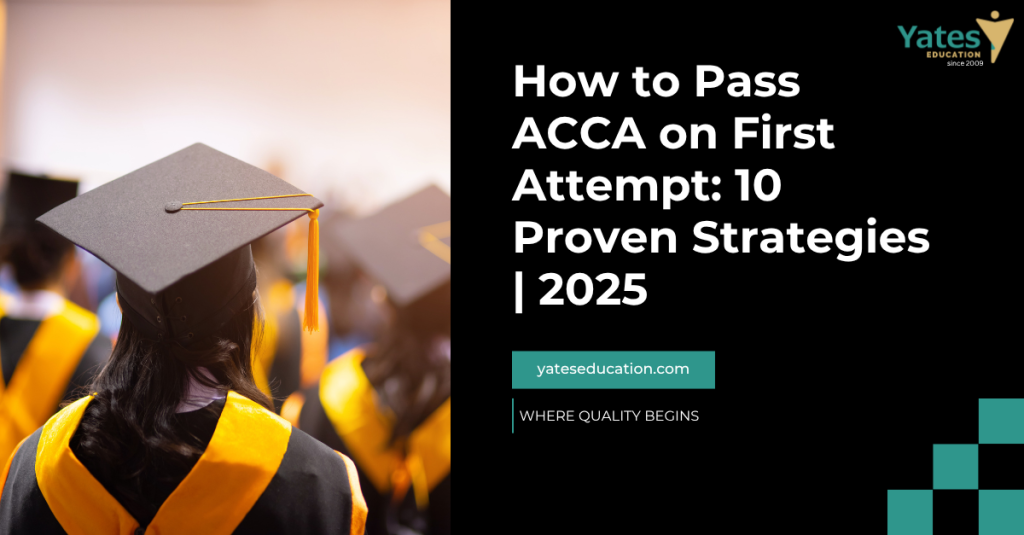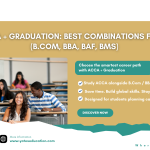Introduction
Every ACCA student dreams of clearing papers on the first attempt. Not just to save money and time, but for the confidence boost it brings. But here’s the truth: passing ACCA on the first attempt isn’t about studying harder; it’s about studying smarter with the right strategy from day one.
We spoke with ACCA toppers, students who cleared multiple papers in their first attempt, and even those who failed initially to understand what truly works. Their insights might surprise you because some of the most effective strategies are rarely discussed in typical study guides. If you’re determined to pass ACCA on first attempt, this guide will show you exactly how to do it.
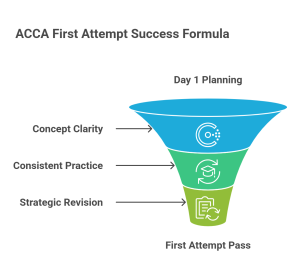
The Foundation: What Successful Students Do Differently
1. Start Preparing from Day One (Not Week One, Not Month One)
Here’s what most students don’t realize: the clock starts ticking from your very first class. The students who pass ACCA on first attempt share one common habit – they treat every single day as exam preparation, not just the last month before exams.
What this actually means:
- Take detailed notes during every lecture (not just listening)
- Solve at least 2-3 practice questions the same day you learn a topic
- Create your own summary notes while concepts are fresh
- Don’t let topics pile up thinking “I’ll revise later”
One student who scored in the 80s shared: “I never had to ‘start’ exam preparation because I was always prepared. The last month was just polishing, not panic learning.”
2. Concept Clarity Is Non-Negotiable (And Here’s How to Actually Achieve It)
Everyone says “concepts should be clear,” but nobody tells you HOW to make them clear. Here’s the real process successful students follow:
The Three-Level Understanding Method:
Level 1 – Surface Learning: You understand what a topic is (e.g., “Consolidation means combining financial statements”)
Level 2 – Application Learning: You can solve standard questions on that topic
Level 3 – Deep Learning: You can explain WHY something works, handle twisted exam questions, and spot examiner tricks
Most students get stuck at Level 2. To reach Level 3, you need to:
- Question everything: Ask “why” after every formula and principle
- Teach someone else: If you can’t explain it simply, you don’t understand it well enough
- Connect topics: See how one concept links to others (e.g., how IAS 16 connects with IAS 36)
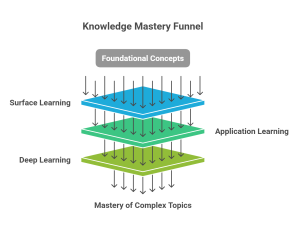
3. The Exam Kit Strategy Nobody Talks About
We heard this from multiple successful students: “Solve exam kits 3 times, but each time with a different purpose.”
First Attempt (After completing syllabus):
- Focus: Learning question patterns and identifying weak areas
- Don’t time yourself yet
- Keep notes and book nearby
- Mark questions you found difficult
Second Attempt (4-6 weeks before exam):
- Focus: Speed and accuracy
- Time yourself strictly
- Try to solve without checking notes
- Redo ALL difficult questions from the first attempt
Third Attempt (2 weeks before exam):
- Focus: Only difficult and exam-style questions
- Create exam conditions at home
- Analyze your mistakes pattern (calculation errors? Concept gaps? Time management?)
Critical insight: Don’t just solve exam kits mechanically. After every question, spend 2 minutes understanding why the correct answer is correct and why wrong answers are wrong.
4. ACCA Articles: The Secret Weapon Most Students Ignore
Here’s a surprising finding from our student survey: 70% of students who failed admitted they never read ACCA technical articles, while 90% of first-attempt passers read them regularly.
Why ACCA articles matter:
- They’re written by examiners who set your papers
- They highlight common student mistakes
- They provide examiner’s thought process
- They’re FREE and directly relevant
How to use them effectively:
- Read subject-specific articles published in the last 12 months
- Make short notes on “examiner expectations” and “common pitfalls”
- Pay special attention to articles about recent exam sessions
- For Strategic Professional papers, articles are almost as important as study text
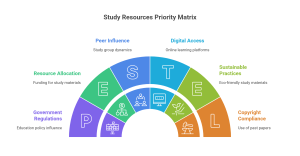
5. Past Papers: Your Reality Check
Solving past papers isn’t just about practice; it’s about understanding the examiner’s mind. Here’s what successful students do differently:
The Smart Past Paper Strategy:
- Start attempting past papers after completing 70% syllabus (not 100%)
- Attempt at least 3-4 complete past papers under timed conditions
- Focus on papers from the last 3-4 exam sessions
- Analyze marking schemes thoroughly – examiners reveal exactly what they want
Pro tip from a topper: “I created a document of all examiner comments from past paper marking schemes. This showed me patterns in what they were looking for – like ‘commercial awareness’ in SBR or ‘application to scenario’ in PM.”
6. Consistency Beats Intensity Every Single Time
The biggest difference between students who pass ACCA on first attempt and those who don’t? Consistency, not cramming.
What consistency actually looks like:
- 2-3 hours daily is better than 12 hours on weekends
- Study at the same time every day (builds a habit)
- Even on bad days, do at least 30 minutes (keeps momentum)
- Track your study hours honestly (what gets measured gets managed)
The 66-Day Rule: Research shows it takes 66 days to form a habit. Start your consistent study routine from day one of your syllabus, and by the time exams approach, studying will feel natural, not forced.

The Game-Changers: Uncommon Strategies That Make a Difference
7. The “Mistake Journal” Technique
Here’s something most study guides won’t tell you: Create a dedicated notebook for mistakes.
How it works:
- Every time you make a mistake (calculation error, concept confusion, silly mistake), write it down
- Categorize your mistakes (conceptual, careless, time pressure, etc.)
- Review this journal 3 days before the exam
- You’ll notice patterns and can actively avoid them in exams
One student shared: “I realized I always made errors in the third question because I was rushing. In the actual exam, I deliberately slowed down on question 3 and scored much better.”
8. The Overconfidence Trap (And How to Avoid It)
Interestingly, we found that both overconfidence AND underconfidence hurt exam performance.
The balance:
- Be confident about your preparation process, not predictions
- Never skip topics thinking “this won’t come”
- Always attempt full-length mocks even if you feel prepared
- The best students are confident but humble enough to keep learning till the last day
A student who failed once said: “I was so confident I’d pass that I didn’t attempt a full mock exam. Big mistake. Time management in the real exam was terrible.”
9. The 48-Hour Pre-Exam Strategy
What you do in the last 48 hours can swing your result by 5-10 marks.
What works:
- Review your own summary notes (not full study text)
- Redo your marked “difficult questions” from exam kit
- Read your mistake journal
- Practice writing answers on paper (not just thinking through them)
- Get 7-8 hours of sleep (tired brain = silly mistakes)
What doesn’t work:
- Starting new topics
- Solving completely new questions
- All-night study sessions
- Stress and panic
10. Join Forces with Serious Students
Your study environment matters more than you think. Students who pass ACCA on first attempt often mention being part of a serious study group or having access to experienced mentors.
What quality guidance provides:
- Accountability (someone tracks if you’re falling behind)
- Doubt resolution (no confusion carries forward)
- Exam insights (someone who knows examiner patterns)
- Motivation (when you feel like giving up)
While self-study works for some, most successful students attribute part of their success to learning from experienced faculty who’ve helped hundreds of students pass before them.
Remember, ACCA isn’t impossible. It’s challenging, but with the right approach from day one, you can absolutely clear your papers on the first attempt. Thousands of students do it every quarter. Why not you?
Final Thoughts
The difference between passing and failing ACCA often comes down to the little things done consistently over time. Start strong, stay consistent, clear your concepts deeply, practice strategically, and believe in your preparation process. Your first-attempt success story starts today.
Good luck, future ACCA qualified professional!

